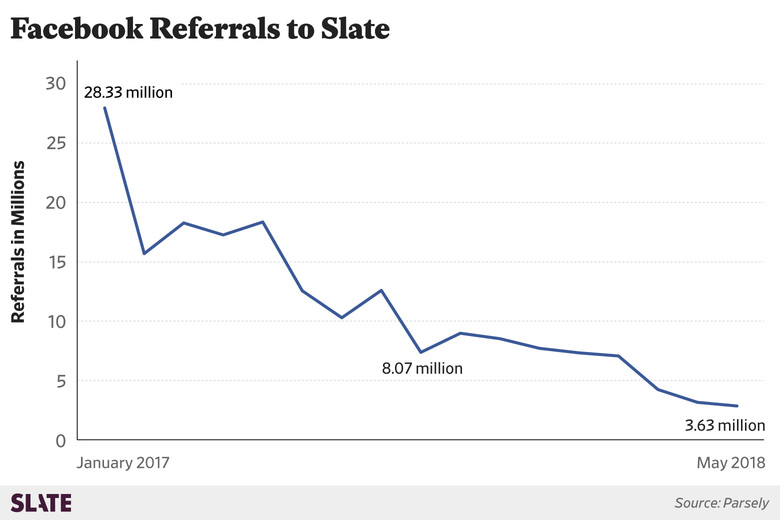
Here, however, are some real American numbers, from Slate, which Slate’s Will Oremus reported Wednesday:
Slate — yes, the publication you’re reading right now — got more than 85 million clicks that originated from external sites and apps in January 2017 alone. Almost a third of them — 28 million — came from Facebook. That was more than any other single outside traffic source. Other online publications with a political focus, such as Vox and Politico, posted similarly blockbuster numbers…
A year and a half later, however, the flood of Facebook traffic to news publishers has receded dramatically…at Slate, which agreed to share its internal data for the first time for this story, traffic from Facebook plummeted a staggering 87 percent, from a January 2017 peak of 28 million to less than 4 million in May 2018. It’s down more than 55 percent in 2018 alone.

That is (duh) a big change — really really big, and possibly bigger than you would have expected based on the fact that Facebook had also said it would be promoting news content from “trusted” publishers. It seems as though Slate would be a trusted publisher, but these numbers “suggest that the site has not benefited from the social network’s new emphasis on ‘trusted’ or ‘informative’ sources.” Facebook wouldn’t comment on who’s “trusted” or not, but here’s one interesting tidbit that Oremus did learn:
When I asked Facebook about Slate’s decline, a representative told me that its data showed Slate in particular suffered a dip in news feed reach in early 2018 after Facebook made a policy change that prohibited pages from accepting money to share content they didn’t create. Slate was one of several publications that had been paying one such company, the Social Edge, to share its stories via a network of popular celebrity Facebook pages, including George Takei’s. (Slate and some others discontinued the Takei relationship in November 2017 in the wake of a sexual assault claim against him.) Slate’s director of strategy and audience development, Bill Carey, confirmed to me that the site saw a further dip in traffic after Facebook changed its policies, although he said that appeared to account for just a fraction of the overall decline. Lorenzo Thione, CEO of the Social Edge, told me via email that the company has discontinued the service in question, to comply with Facebook’s policies.
This would suggest, at least, that publishers need to be cautious about the social marketing companies they’re contracting with. Would Slate ever have known it got dinged for using Social Edge if Oremus hadn’t asked as part of a broader question?
Overall, “Sources at several major publications told me they’re now seeing less than half the referral traffic from Facebook that they were receiving in the first half of 2017,” Oremus writes. “But few would go on record, whether because their employers consider the information private or because they don’t want to risk compromising their ongoing relationship with Facebook.”
What does an “ongoing relationship with Facebook” even mean now, though? (On Wednesday, Facebook noted that the sales of news subscriptions via Instant Articles, a format many publishers are abandoning, are “promising.”) Maybe now that Slate’s gone first, others will follow.
more👏of👏this👏please👏 https://t.co/nlCR2WIeVQ
— rebecca rosenberg (@missrrosenberg) June 27, 2018